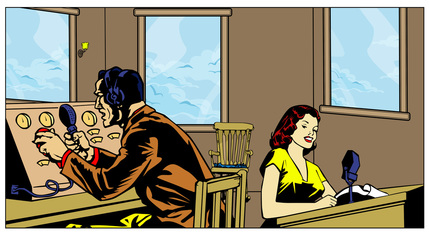|
Get the info to this super sexy video in PDF form here: https://www.onlineradioschool.com/common-mistakes.html
Everything you say needs to have a beginning, middle and end. And I mean EVERYTHING! In the last 18 years, I've seen soOoOOoOoOO many presenters waffle and waffle. They think they're amazing by just 'giving it;', when in fact they're just talking cow poo. And trust me, I've heard sooooo much cow poo over the last 18 years.
Before you open your gob, know EXACTLY what you're going to say. Know how you're going to start your presenter link and MORE IMPORTANTLY know how you're going to finish it. Ask yourself this: how are you going to introduce your next item? Random waffle is baaaad; prepared speech is awesome. So, do you know what you're going to say now? Ashley WARNING: This is a rather long blog post! In this post I'll cover: What's a radio presenter? The playlist radio DJ Specialised music radio presenters The two types of talkshow radio presenters Matching your show content to the format Keeping the tone the same Targeting the right station with your show Creating a radio talkshow Do I need to study at college to be a radio DJ? Radio presenter hacks Plus much more So you want to become a radio presenter? Well good for you! I've been a radio DJ on three FM stations. (This was back in the days when FM was big.) I've also hosted radio shows on far too many community radio stations O_o! Let me tell you this, being a radio DJ is great fun. I've been training volunteers in radio for eighteen years now and.... The Number One Radio Question I'm Always Asked Is.... What qualifications do I need to be a radio presenter? It's a great question, but first, we have to take a step back and look at what a radio presenter does. Radio Presenter Defined A radio DJ is the voice of the radio station or the main voice of the radio programme. You can be a radio DJ in music radio, a speech-based radio presenter on talk radio, a sports-based radio presenter or you can be a radio reporter. The Three Types of Radio Presenter There are three main types of radio presenter. Playlist radio DJs, specialised music radio presenters and talk based radio hosts. Music Radio: The Playlist DJs Most paid radio presenters work in 'playlist radio.' That is, the radio DJ is given the music to play at the radio station. The music is in the format of a playlist. The DJs have no say over what music they can play. The radio station has researched their audience and pre-selected music to match their listener's interests. A radio presenter's job here is to find compelling content to talk about in between the music. At a playlist station, the material the radio host presents must be similar to the output and style of the station. Click here to see a perfect example of this. The Content Must Match The Output This is a very important point to note. The content the radio host finds and presents must be similar to the output and style of the station. Mirror the Output of Your Station Let's say your radio station is an entertainment based station. When sourcing content for your show, what do you need to do as a radio presenter? Match the Audience's Passion You will need to read the same websites as your audience, watch the same TV programmes as your audience, listen to the same music as your audience etc. We do this for two reasons: 1) It makes it easier to research related content. 2) Your content will match your audience's passions. Doing this means you'll be able to connect better with your audience on a one to one basis. Connect Rather Than Disconnect If you're presenting a music-based radio show, then there's no point having loads of references to an audience from a different region. For example, those childhood references to your youth in south London won't be relevant to an audience located in Scotland. Target the Right Station with Your Show I managed a hospital radio station with over thirty volunteers for six years. Our main listener base was the elderly and infirm. i.e. predominately people aged 50 and over. Many volunteers approached us wanting to present hip-hop, trans based, heavy metal, grunge rock shows etc. However, we were a station that had a gold format. These shows were not relevant to our audience. We always turned these DJs away. We needed radio DJs to present radio shows that our audience would want to listen to. You may want to present a show on toy trains and movie theme music, but if your show has nothing to do with what the station is about, then no one will want to listen to you. (Click here for an exception to this rule.) Match the Music Policy of the Station The music policy of our hospital radio station was to play music from the 1950s to the early 2000s. We needed our DJs to find show content that connected with our "theme" / listener base. In the case of our hospital radio station, this meant targeting seniors. So whatever music playlist station you're presenting at, you need to know your target audience. Who are they and what do they like? How do you find this information out? Simple. Ask the station manager or the programme controller this question. Keep the Tone the Same: Classic FM I once did work experience for Classic FM. Classic FM is a UK national commercial radio station that broadcasts classical music. The Classic FM presenters tailored their shows to match the output of the station. In other words, their content was relevant to the station and their audience. However, they also presented in the same tone and style of the station's output. For example, Classic FM plays relaxing music, so their DJs also presented in a relaxed manner. I'm a Hip and Trendy Radio DJ If the station presents an image of being an upbeat, hip and snappy station for young people, then your style of presenting needs to mirror this image. In other words, you'll also need to be upbeat, hip and snappy as well. Well... "DUH!" While this sounds incredibly obvious and a bit of a "duh" moment, many new presenters still don't do this. They rock up to a community radio station and want to present a radio show that has nothing to do with the output of the station. My advice is, please don't do this. It's pointless. You'll only be broadcasting to yourself. Remember: Match your show to the tone of the station. Don't be like a certain author who thought that a sketch-based comedy show would work well on a soul based music station. It didn't. Live and learn hey! Exception to This Rule: Mixed Programming Stations Again there is an exception to this rule. What if your radio station has mixed programming? In other words, anyone can present any type of radio show? For example, it goes from a rock show straight to a poetry show. I've answered this in a massive blog! Music Radio Presenting: Specialised Music Radio DJs You can also be a radio disc jockey that hosts a specialised music show. John Peel is a very famous UK example. Specialised music radio DJs often select their own music and create their own shows. In other words, they have the creative freedom that playlist radio DJs don't have. Creating, presenting and playing music that you love can be an incredibly rewarding experience. These types of radio shows were always my preferred format of radio presenting. It's one reason why I love community radio. Presenters can create their own shows, support local bands, and can also help the local community. It's another reason why I train for free in local radio. While there may not be many paid jobs in community radio, it's not all doom and gloom. In my next blog, I'll discuss "listen again." Listen again has opened up a new door for radio presenters. Keep Your Radio Show Synced Remember, you still have to match your content to your audience. So if you're targeting a rock audience, then make sure what you talk about is relevant to that audience. Many new presenters forget this point. They end up rambling about nothing related to their audience. A classic I hear time and time again is: "Guess what I did/ate/drank watched last night etc.?" Talk Based Radio Presenters Talk based radio broadcasters often work on talk shows that discuss topical issues. A good example of this could be Adrian Chiles on BBC Radio 5 Live. There are a few different ways that talk show radio presenters can host shows. The Topic / Question-Based Talk Show One way is to pick a topic and then ask a question. For example, let's say the topic is Israel and the question is: Does Israel operate an apartheid state? The talk show presenter introduces the topic to the listeners. Next, they open up the show for a debate on the subject. Two Ways to Host a Radio Talk Show: Impartial or Not? For many years in the UK, radio DJs were impartial. That is, they didn't take a side in the debate. They simply played a devil's advocate role. Let's take our Israeli topic as an example. In an impartial debate, the radio host would introduce the subject, give a pro argument analysis, give an anti-argument analysis and then throw the debate open to the public. They may also have studio guests from opposing sides of the argument. Callers would phone in and debate the subject with the guests. The host's role, in this case, would be to stay neutral. They'd drive the discussion forward and also bat the questions from side to side. The Non-Impartial Radio Talkshow Host In recent years, the UK has moved towards more of an American format of talk show. In this case, the host of the show doesn't stay impartial. They state their personal views and the audience tries to persuade the presenter. The idea behind this method is to generate controversy. Controversy motivates people to call in and argue their point of view. talkSPORT in the UK has been incredibly successful using this approach of presenting. (And later on, I'll be writing a blog about how I think talkSPORT is a great station to study.) There's No Right or Wrong Way to Talkshow Presenting While my favourite style of radio talk show is to have an impartial host (I worked for the BBC remember!), I'm also a massive fan of talkSPORT. There's no right or wrong way when it comes to presenting talk based radio shows. It just comes down to a matter of personal taste. Which method do you prefer and why? Drop me an email and let me know! Creating a Radio Talkshow Format When I was at BBC Radio London, the producer and presenter would get together and discuss the big news stories of the day. Once they'd decided on the topics, the next step was to consider their questions. They needed to think about what type of questions would generate debate. What would encourage listeners to make contact with the show? Then they would section their show off and cover two to three subjects throughout the transmission. Pre-Recording Radio Shows Radio presenters can also pre-record their shows. One time at a UK national radio station, I noticed that the radio DJs had pre-recorded their presenter links onto a CD. My job as the technical operator was to play the pre-recorded 'presenter links' in between the songs. Every day the producer would select the music for the next day's show. He/she would then send a list of the songs to the presenter. The presenter then recorded their links onto a CD. (Remember, this was ten years ago = CD.) My job was to play the song from the computer playout system and then follow it with a numbered presenter track from the CD. Can you imagine if that went wrong! Mixed Programming and Listen Again I've decided to write a separate blog about this topic. Do I Have to Study Radio at a College Level? This question is difficult to answer. It has many layers to it. In short, it's no, yes, maybe. No: You Don't Need to Study Radio at a College If you want to be a music radio DJ, then my answer is no. However, it's not so clear cut. It's a tricky answer because I went to radio college. At college, I learned the basics. However, radio college didn't teach me how to be a radio DJ, and it didn't get me the job at the BBC. Nowadays, there are thousands of internet radio stations where you can get free, full-on practical radio experience. It was much harder to find this in 1997. After I left Lambeth College, I joined the hospital radio station, Radio Kings. The truth is, it was my volunteer work at the hospital radio station where I learned the most radio skills. Two years after joining Radio Kings, I became the manager. Suddenly, I was running a community radio station with two broadcast studios and thirty volunteers. This experience gave me professional authority. Next, I trained in all aspects of radio. My hands-on community radio experience was the main reason I was employed at the BBC. They wanted radio skills, but they also wanted people and teamworking skills. Disclaimer to This Answer However, if there is a radio course at your local college and it's cheap, then go for it. When I was unemployed, I studied an H.N.C in Radio Production at Lambeth College. In 1997, it cost me £30 / $40. I got the course cheap because I was unemployed. A couple of years ago, the UK government changed the rules. Nowadays, if you're unemployed and over 24 years old, then you have to pay £1,000 / $1,400 for the same course. That's too much money for a radio course. If you want to become a music radio DJ, then my advice is you don't need to pay £1,000 for a course. Study with me and build up a good portfolio of work. A good portfolio of work (and a rocking website) allows you to approach potential employers. You don't need college for that. Always Join a Community Radio Station You definitely should join a local radio station. Use my radio presenting course to gain the necessary skills, and use the station's equipment for practice. Being at a local station also gives you something to put on your CV. Having a pumped up CV is important. Check out my blog: How to apply for jobs in radio here. When Radio College Is a Good Idea Radio college is useful when you want to be a radio journalist. Strong journalism skills get you into jobs like news reading, radio reporting etc. These are skills you can teach yourself, but many employers want to know that you've had official journalism training. This is so you don't make a costly mistake and say the wrong thing on air. In other words, defamation etc. Defamation can get you sued. The next question you want to ask is, do you want to be a radio journalist/reporter? Journalism is very different from being a music radio DJ. Do you really want to cover topics like death and tragedy etc.? Making Radio Documentaries You don't have to ask tough questions to make radio packages and radio documentaries. Check out "The Beginner’s Guide To Making Radio Documentaries" here. You don't have to be a journalist to be a talk show host. However, you do need to know about libel, editorial guidelines and what you can and can't say on the radio. Get these wrong, and your station could be sued. My radio presenter course covers libel for music radio DJs. Radio Presenting Hacks Before we finish this massive blog on how to be a radio presenter, let's look at some radio presenting hacks. Present with a Purpose When presenting a radio show, it's important to have a purpose to everything you say. Make sure everything has a beginning, middle and an end. Present Your Radio Show to One Person Present as though you're only talking to one person. It will give your show a more personal feel. Don't talk to a group of individuals. It will sound impersonal. Know Your Audience Know your audience. Make sure you connect with them. Like what they like, talk like they talk. Be interested in the same things as them. Use Your Emotions When Being a Radio Presenter Use your emotions when presenting. Laugh when something is funny, feel sad when something is sad etc. However, try not to project anger. Anger is a very negative emotion. Anger can make you sound arrogant. As DJs, we need to capture our audience, not push them away. Plan Your Radio Show Always plan your shows. That means doing your research, scripting your links, selecting your music, finding your content, creating your running order, practising your openings etc. It takes a lot of hard work to be a real radio DJ. Many new presenters think they can just wing it. Trust me; you can't. I've tried it. If you make it up as you go along, you'll end up producing a poor show that no one wants to hear. The Number One Radio Presenting Tip If you take one important thing away from this blog of doom, it's this, ALWAYS prep your shows. Listen to Your Radio Station Listen to your radio station and know what's going on. Many presenters at community radio stations live in their own show bubble. They get so focused on their shows that they don't listen to the station. You need to know what the other DJs at your station are doing. In fairness, I have also been guilty of this myself. Promote Other Radio Shows Promote other DJs shows on your show. You're not in competition with them. Email them and ask if they have any interesting guests etc. coming up on their shows. Most of them will return the favour. The more listeners the station has, the more chance your show has of being discovered. Promoting other radio presenter shows is win-win for you and the station. Know What Your Radio Station Is Involved In Knowing what your radio station is doing is also important. It means you can trail events and community projects for your station. Don't just think of yourself and your show, think of your station as well. Listen Back to Your Shows Listen back to your radio shows/podcasts and see where you can improve. How were your audio levels? What was your content like? Did you feel you connected with your audience? How was your tone? Were you using inflexions or did you present in a monotone way? How was your delivery? Was it too fast, too slow etc.? Quick Recap Your role as a radio presenter is to provide 'relevant' information to the listener. Your job is also to provide 'interesting' information to the audience. Interesting being the keyword here. Whenever I'm training any radio student, be it in person or online through my online radio courses, my number one mantra is always: Make everything you talk about have a purpose. Make it interesting and relevant to either the show or the station. Too many beginner radio presenters talk aimlessly without any purpose to their output. Please don't do that! Bonus Radio Presenting Tip To develop an impressive one-hour, jam-packed radio show can take up to two days of hard work. Once you’ve presented that show on air, you have to start preparing the next show. Radio presenting is like a factory. You need to develop a system of preparing. Present your show, then take a day off and relax. Now, you have six days to prepare for your next show. Six days sounds like ages to prepare a radio show, but in reality, it isn't. It normally takes one full day to prep a well thought out, well-researched, professionally sounding show. Preparing your show at the last minute takes a LOT of energy. Of course, I never did that! O_o Try and avoid last minute preparing. I speak from experience. Break the job up. Block off sections in your diary to prepare your show. Always think ahead. If you don't do this, you'll run out of time. Then you'll be prepping at the last minute once again. You know you've done this already! Start with the fun part. Select your music. It will help you start. Next, make a running order. Work out your timings. Finally, work on your presenter links. If you don't push yourself, you'll get "comfortable." "Comfortable" = bland shows. Bland shows = always being an average hospital/community radio DJ. Pull yourself up with self-critique. It will raise your standards. Professional standards will lead you to make excellent radio shows. Good radio shows open doors. Gather as much radio experience as you can. Study how to present, how to operate the mixing desk, how to create radio packages, learn to interview etc. The experience I gained at hospital radio led me to become a studio manager at the BBC. Never be an arrogant radio presenter. Always listen to your radio trainer. Take on board everything they tell you. Develop an attitude of wanting to learn and wanting to improve. If you can’t find a radio trainer, then enrol on one of my courses. You’ll be able to ask me for advice anytime. I'll even listen to your shows and offer feedback. Listen Again Blog Coming Soon Got a question? Drop me an email: onlineradioschool@protonmail.com And now for coffee! Ashley Learn where to find show ideas. Discover how to show prep like a pro. Master the mixing desk. What it is, how it works and how to use it. Discover what you shouldn't do as a presenter. Ashley Cowan runs the Online Radio School where he tutors in radio presenting and media interviewing techniques. He was a BBC World Service, Radio studio manager for nine years. He was also the station manager for Radio Kings, the hospital radio station for Kings College Hospital. Other crimes include being the training manager for K2K Radio & Whitechapel AM. As a radio presenter, he's hosted radio shows on three FM stations. That was back in the day when FM radio was a big deal. The poor radio stations that had to put up with his brand of terrible comedy were: Radio DÅB, FLR 107.3 FM, and City FM. Radio DÅB had 100,000 listeners! Woo! When he's not writing about himself in the third person, then he was also a community radio DJ at Radio Kings, TGR Sound, Sydenham Radio, and Croydon Radio. He once did production work for Total Rock.com. That was a fun station with a cool owner and a great broadcast team! Brown fizzy water often accompanied the broadcasts! In his spare time he's London Irish (so he likes a beer) and he also teaches guitar. He's recently created an online "Fingerpicking for Guitar" course. There he teaches the art of fingerpicking for erm...guitar. Students can learn twenty different fingerpicking styles for their chords. Critical Media Questions to Consider When Interviewing Starting Off What's the main issue here? What information do I have? What information do I still need? What are the pros about this information? What are the negatives about this information? What's interesting about this information? Force yourself to look for alternatives to the information presented. Discover The Secrets To Successful Media Interviews. Using Graphs and Pictures It's often easier to use graphics, graphs, mind maps, flow charts, etc. when representing written information. If you can, turn the written information into a visual representation. Be Objective Most of us think in a way which backs up our views; however, we need to be objective. What are your biases? Subconsciously you may lean towards certain points of view. Kill your beliefs and become neutral with the information. Do you know anyone who has an entirely different viewpoint from yourself? Talk to them about the information with regards to their point of view. E.G. you may be looking at the information from a left wing perspective. Talk to them and get a right wing perspective. They may spot things that you hadn't considered. Don't Jump to Conclusions Analyse the topic etc. from all angles. Can you trust the numbers and information being used to support this point of view? Are there assumptions being made with this information? Is the information reliable and genuine or is it based on an assumption? Are there alternatives to this information? What other things do you need to know? Take the information and come at it from an opposite point of view. Find/create counter arguments to the evidence. Don't just accept the information at face value. What Are You Taking for Granted? When researching a topic or interviewing on a subject, ask yourself "what am I taking for granted?" Is what I'm reading true? Are there persuasion techniques being used with the information/argument? Does this information/evidence use emotion instead of sound facts/information? Are you being forced to conclude a point? Should you explore different viewpoints? As you study the information, what do you need to keep in mind? Play with Different Endings Take the information and create various outcomes. Who are the main players? What are their viewpoints? How does this outcome benefit the main players? How does this outcome hinder the opposition? Analyse all outcomes. Invent different outcomes. Who's set to win with your conclusion? Who's set to lose? What effect will your conclusion have on others? Who will disagree with your conclusion? What are their main arguments against your conclusion? Do their arguments make sense? If it does, what have you missed? When creating your final argument, what was the primary information that you based your decision upon? Is that information reliable? Would new information change your final argument? Learn where to find show ideas. Discover how to show prep like a pro. Master the mixing desk. What it is, how it works and how to use it. Discover what you shouldn't do as a presenter. Ashley Cowan runs the Online Radio School where he tutors in radio presenting and media interviewing techniques. He was a BBC World Service, Radio studio manager for nine years. He was also the station manager for Radio Kings, the hospital radio station for Kings College Hospital. Other crimes include being the training manager for K2K Radio & Whitechapel AM.
As a radio presenter, he once hosted radio shows on three FM radio stations. That was back in the day when FM radio was a big deal. The poor radio stations that had to put up with his brand of terrible comedy were: Radio DÅB, FLR 107.3 FM, and City FM. When he's not writing about himself in the third person, then he was also a community radio DJ at Radio Kings, TGR Sound, Sydenham Radio, and Croydon Radio. He once did production work for Total Rock.com. That was a fun station with a cool owner and a great broadcast team! Brown fizzy water often accompanied the broadcasts! He's London Irish (so he likes a beer) and he also teaches guitar. He's recently created an online Fingerpicking for Guitar course. There he teaches the art of fingerpicking for erm...guitar. Students can learn twenty different fingerpicking styles for their chords. I've been training beginner radio presenters for eighteen years now. I get asked this question a lot. Should I type out my words when I present a radio show? All Radio DJs Are Different Every radio presenter has their unique way of presenting a radio show. However, for beginners, I always make them script their links. In other words, I make them type out exactly what they're going to say. At first, they all moan and groan :) Example "Hello & welcome to Whitechapel AM, your award winning radio station! Here with you for the next hour ….My name's Bobby, and you’re listening to Music to Make you Smile." (Click here for an excellent example of how to start your show.) The Circle of Doooooom I make radio DJs type out their shows for a couple of reasons. When a radio presenter has to type out their entire show, it forces them to think about their content. It helps them see if their show is strong or weak. Beginner radio broadcasters are impatient. All they want to do is open the microphone and start speaking. However, it never works like this. In the real world of broadcasting, this method makes for an awful show. Community Stations Need to Monitor Their Output A lot of community stations don't bother to track their DJs content. They give the DJ an on-air slot and then just leave them alone. No one follows up on the content. The trouble with this method is that the DJ continually puts out weak shows. If no one is analysing their show, they're not going to improve. A radio show which is unprepared and unmonitored doesn't sound great. It also doesn't have many listeners. When no one is listening to you, your motivation for presenting begins to drop. When your motivation drops, then you can't be bothered prepping. When you're not prepping, then your show sounds poor, and around and around we go. The Community Station Excuse "We're voluntary run, so we don't have the manpower." My Replies Do you want your station to broadcast poor shows or great shows? When you set up the station, was your goal to broadcast weak shows? If you don't listen to the shows, how do you know if they're any good? If the programme controller/station manager can't offer show feedback, then delegate that task to an experienced volunteer. Scripting Makes You Prep When I force beginner radio presenters to script their links, I'm forcing them to prep at the same time. My hope is that scripting their links makes their shows strong from the start. Presenters with prior experience hate doing this. Beginners who start off by scripting tend to end up better than the experienced presenters. I've found that the more experienced presenters that don't script tend to waffle a lot more. There's less focus to their links; there's less journey for their show, there's less purpose to their content. Scripting Takes a Lot of Effort and Time Scripting takes a long time, and it takes effort. Many beginners spend two days prepping their one hour show. They often come to me and say: "I can't believe how much work I've put into this." My reply is always the same: "Good. Now you'll have a strong show." And they always do. Scripting Gives You Confidence Many beginner DJs are very nervous. There are many things they have to master. For the first two weeks, we focus on technical operations. From week three to week eight, we focus on show content. Making the beginner DJ script gives them confidence. When they're confident, they relax. At Whitechapel AM, (a hospital radio station in East London) I created an eight-week radio presenter course. From week three to week eight, myself and the DJ listen back to the shows. In other words, we analyse their content. It's at this moment when the penny drops. They suddenly realise their shows are pretty bad. I love seeing the light bulbs going off in their heads! They're like, "Yeah, I DO have to prep!" The Bullet System After a few shows, I give them the option of bullet pointing their links. They don't have to type out every single word. They can structure their show in chunks and ad lib a bit more. Example Show Opening Straight into music followed by story on Donald Trump Move into The Beatles Taxman song Give out station ident Straight into song Discuss topic about open mics Then I ask them, which system do they prefer? Surprisingly, most of the presenters I've trained stick with typing out their links. There is no right or wrong way here. It's what works best for you. I like to script; others don't. Try both methods and ask yourself, which method produces the best show? Make Sure It Sounds Natural Of course, when you script a show, it has to read naturally. It's important to read out your links and practice them thoroughly. Actors do this with their lines; radio DJs need to do the same. If it doesn't sound like you, then retype it. At the end of the day, whether you script or bullet point your show, you have to prep well. Crap in = crap out. If you're a total beginner, my advice is: type out your links word for word. Later on, you can switch over to the bullet system if that's easier for you. And now for coffee! Click here for more radio advice blogs Learn where to find show ideas. Discover how to show prep like a pro. Master the mixing desk. What it is, how it works and how to use it. Discover what you shouldn't do as a presenter. Ashley Cowan runs the Online Radio School where he tutors in radio presenting and media interviewing techniques. He was a BBC World Service, Radio studio manager for nine years. He was also the station manager for Radio Kings, the hospital radio station for Kings College Hospital. Other crimes include being the training manager for K2K Radio & Whitechapel AM. As a radio presenter, he once hosted radio shows on three FM radio stations. That was back in the day when FM radio was a big deal. The poor radio stations that had to put up with his brand of terrible comedy were: Radio DÅB, FLR 107.3 FM, and City FM. When he's not writing about himself in the third person, then he was also a community radio DJ at Radio Kings, TGR Sound, Sydenham Radio, and Croydon Radio. He once did production work for Total Rock.com. That was a fun station with a cool owner and a great broadcast team! Brown fizzy water often accompanied the broadcasts! He's London Irish (so he likes a beer) and he also teaches guitar. He's recently created an online Fingerpicking for Guitar course. There he teaches the art of fingerpicking for erm...guitar. Students can learn twenty different fingerpicking styles for their chords. Conversational Advice / Writing for Radio As we’re writing for the ear, we need to grab the listener's attention straightaway. We also have to keep their attention. Beginner presenters who translate newspaper articles tend to write their links in a written style. Writing this way, however, doesn’t work for radio. For radio, we need to write in a conversational manner. Our listeners need to understand the information first time around. Unlike a book, in live radio, they can’t go back to the point again. Conversational Tone Try to keep your presenter links as natural as possible. Think about it as telling a story to a friend in a pub. Write in a style that sounds relaxed. Use the same words and phrases that you’d normally use in everyday life. Use contractions. Write “don’t” instead of “do not” etc. Practice reading your links aloud. Actors do this with their lines. Their goal is to make their lines sound conversational and natural. For us as radio presenters, we have the same purpose. Therefore, when you practice reading your links aloud, consider if it sounds like you. Use Visual Words Let your listeners imagine. Your links need to help your listeners picture images, people, and places, etc. Use descriptive, describing words. Keep it Focused Long winding sentences packed with words etc. don’t work well in music radio. Think in short chunks and keep it varied. Listen to the professionals. Study how they're presenting their information. Consider Tenses Present tense tends to give the listeners a sense of familiarity and intimacy. It’s not always possible to write everything in the present tense, however, keep this in mind when scripting your links. Try not to bounce between different tenses in your link, i.e. moving from present tense to past tense, then back to present tense again, etc. Of course, this is not always possible. It's just a suggestion to consider if you feel your link is not working. Ask Why Don’t just give the facts of a story. Ask yourself, why does this story matter? Can you learn something from this story? Can you relate something from this story to your real life or your listener's real life? You don’t have to give an in-depth breakdown of every single point. However, do consider moving the story on to another point. If you do this, it can be more interesting than just reporting the story alone. Example Dave from Dartford fell out of a window onto twenty boxes of eggs. Lame egg joke - into song. Dave from Dartford fell out of a window onto twenty boxes of eggs. Lame egg joke - link to a point in real life, which the listeners can relate to - move the story onward - tell us what we learned from the story- into song. Be Active Use the active voice. Lecture 10 on the radio presenting course covers this point. Use verbs that “kick!” Try not to break up your subjects and verbs. (This point is geared more to news writing, but it’s worth noting.) Example Bernard Stockton, who is the head trainer of We Rock AM, says We Rock AM is rocking. We Rock AM head trainer, Bernard Stockton, says the station is rocking. Bernard Stockton is the head trainer of We Rock AM. He says the station is rocking. By the time you get to the end of the first sentence, Bernard Stockton gets lost. The next two sentences make the information clearer. Learn where to find show ideas. Discover how to show prep like a pro. Master the mixing desk. What it is, how it works and how to use it. Discover what you shouldn't do as a presenter. "What's that you say? You still love me? Well, I love you too!" Ashley Cowan runs the Online Radio School where he tutors in radio presenting and media interviewing techniques. He was a BBC World Service, Radio studio manager for nine years. He was also the station manager for Radio Kings, the hospital radio station for Kings College Hospital. Other crimes include being the training manager for K2K Radio & Whitechapel AM. As a radio presenter, he's hosted radio shows on three FM stations. That was back in the day when FM radio was a big deal. The poor radio stations that had to put up with his brand of terrible comedy were: Radio DÅB, FLR 107.3 FM, and City FM. Radio DÅB had 100,000 listeners! Woo! When he's not writing about himself in the third person, then he was also a community radio DJ at Radio Kings, TGR Sound, Sydenham Radio, and Croydon Radio. He once did production work for Total Rock.com. That was a fun station with a cool owner and a great broadcast team! Brown fizzy water often accompanied the broadcasts! In more of his spare time, he's London Irish (so he likes a beer). He's recently created an online "Fingerpicking for Guitar" course. There he teaches the art of fingerpicking for... erm...guitar. Students can learn twenty different fingerpicking styles for their chords. If you'd like him to listen to one of your shows and offer feedback, then click here. In 2016, I ran an eight-week radio presenter training course at Whitechapel AM. A typical mistake that beginner presenters make is when they question their guests. They’ll have a topic; they’ll mention their point of view, and then they’ll ask their guests for their opinion. It generally goes like this: Prepared Script “The star is offering four hundred lucky guests - the chance to come and see her perform - With tickets ranging in price - from four thousand pounds to a whopping one hundred and fifty grand ..blah blah blah.” What do you think Dave? - Answer. Jackie. What do you think about this? - Answer. Stephen. Is she charging too much?” - Answer. Why This Form of Questioning Doesn’t Work There are two problems with this style of questioning. The first issue is that the presenter hasn’t bothered to think about their topic. They also haven't bothered to think about their questions. It’s basically: “I think this. What do you make of this?” It makes for boring radio. The second problem is that the conversation and topic never move on. The guests' replies are also very similar. Similar replies makes the segment sound dull. What You Need to Do Is: 1) Have a beginning, a middle and an end for everything that you want to discuss. 2) Know how you’re getting into your topic. 3) Know what you're going to discuss. 4) Know how to move the issue forward. 5) Understand how you’re going to end the segment. Plan Your Journey Beforehand If you’re commenting on a news story and you’re throwing it open to your guests, then plan your “journey” beforehand. Example of Moving the Topic Forwards Here's an excellent example of questioning your studio guests. It came from one of my trainees on my eight-week radio presenter training course. Let's look at it first and then break it down. Presenter: “The star is offering four hundred lucky guests - the chance to come and see her perform - With tickets ranging in price - from four thousand pounds to a whopping one hundred and fifty grand ..blah blah blah. If you had the money, would you pay four grand or more to see Madonna - or anyone else? Is this a good thing - using her name to help charities? What do you think of celebrities cashing in on their fame? Or do you think - this is just Madonna promoting herself? Call us and let us know on XXXXXX And we have our lovely guests on the show tonight - I’m sure they’ll have some thoughts on this. Mel, Duncan, Joshua and Andreas. Good evening. To Mel: What do you think of celebrities endorsing or setting up charities? To Duncan: Would you pay so much to see Madonna? To Joshua: Who would you pay four thousand pounds to see? To Andreas: Have you ever spent a huge amount of money - to see your music idol? I’m sure you've all got thoughts on this. If you’d like to share them with us, then call now on XXXXXX. Whitechapel AM.” Let’s Take a Look at Why It Worked 1. Describe the Story You’ve done your show prep and you’ve researched! :) You’ve found an interesting story for your show. You describe the story to your listeners and your guests. “The star is offering four hundred lucky guests - the chance to come and see her perform - With tickets ranging in price - from four thousand pounds to a whopping one hundred and fifty grand ..blah blah blah.” Tip Always write your numbers in words. It makes it easier to read. 2. Throw the Question Open to Your Listeners "If you had the money, would you pay four grand or more to see Madonna - or anyone else? Is this a good thing - using her name to help charities? What do you think of celebrities cashing in on their fame? Or do you think - this is just Madonna promoting herself?" 3. Call for an Interaction "Call us and let us know on XXXXXX” 4. Now Move on to Your Guests “And we have our lovely guests on the show tonight - I’m sure they’ll have some thoughts on this. Mel, Duncan, Joshua and Andreas. Good evening. To Mel: What do you think of celebrities endorsing or setting up charities? To Duncan: Would you pay so much to see Madonna? To Joshua: Who would you pay four thousand pounds to see? To Andreas: Have you ever spent a huge amount of money - to see your music idol? 5. Final Call for Interaction I’m sure you've all got thoughts on this. If you’d like to share them with us, then call now on XXXXXX. Whitechapel AM.” Why This Style of Questioning Works 1. He’s researched the topic and he's found further questions to ask on the same subject. 2. He asks his listeners different questions (on the same topic) to get them thinking. 3. He asks each guest a different question to move the item on from the last point. 4. He sums up the topic and once again calls for interaction from the audience. Create a Journey for Your Questions When you look at his questions, you see he’s created a journey. The topic is always moving. It’s much more interesting than: What do you think A? What do you think B? What do you think C? To Recap: Find an interesting story for your show. DO YOUR SHOW PREP! :) Have a beginning, middle and end for your topic. Prepare / ask some questions to get your audience interested and thinking. (We're after an interaction.) Research further questions to ask your guests. (We're after their interaction.) Ask each guest a different question. It will give your topic a “journey,” and it will stop your guests giving similar answers. Recap with a call for audience interaction. Learn where to find show ideas. Discover how to show prep like a pro. Master the mixing desk. What it is, how it works and how to use it. Discover what you shouldn't do as a presenter. A random Japanese Twitter friend drew this for me. I like it! Ashley Cowan runs the Online Radio School where he tutors in radio presenting and media interviewing techniques. He was a BBC World Service, Radio studio manager for nine years. He was also the station manager for Radio Kings, the hospital radio station for Kings College Hospital. Other crimes include being the training manager for K2K Radio & Whitechapel AM. As a radio presenter, he's hosted radio shows on three FM stations. That was back in the day when FM radio was a big deal. The poor radio stations that had to put up with his brand of terrible comedy were: Radio DÅB, FLR 107.3 FM, and City FM. Radio DÅB had 100,000 listeners! Woo! When he's not writing about himself in the third person, then he was also a community radio DJ at Radio Kings, TGR Sound, Sydenham Radio, and Croydon Radio. He once did production work for Total Rock.com. That was a fun station with a cool owner and a great broadcast team! Brown fizzy water often accompanied the broadcasts! In his spare time, he's London Irish (so he likes a beer). He's recently created an online "Fingerpicking for Guitar" course. There he teaches the art of fingerpicking for... erm...guitar. Students can learn twenty different fingerpicking styles for their chords. Comedy Training Blog 3 Meet Romedales Bufflehead It’s 7:05 pm and Romedales Bufflehead steps off the train at East Dulwich station in south London. With his Oyster card in hand, he starts to floss his trendy hipster beard. Only cool people had hipster beards thought Romedales, as a chicken leg fell from his beard onto platform one. The Nerdy Man’s Beard The whole hipster beard fashion was a bit of a con really. Many hipsters thought themselves cool with their beards. Many others, however, thought the whole beard thing was just an attempt by boring, nerdy middle-aged men, to try and make themselves seem a bit cooler. And to be honest, it did work for a while. That was until Sharon from the Catford Tesco’s went “Eeer Romedales you plonker, you’re just a boring middle-aged computing nerd with a beard. I’m out of here..By the way that’ll be £2.45 plus 5p for the plastic bag.” Romedales was devastated. Bang went his 30% Tesco discount. Beards are for Winners Sharon thought he was a bit of a loser. A man with lentils and a KFC chicken wing dangling from his beard wasn't cool. She had met Romedales in her local supermarket. He was the bloke with a pot noodle dangling from his face. East Dulwich is Peckham with a Beard As he stood at platform one in his green flannel shirt, bucket hat and beat up Converse trainers, Romedales rolled up a cigarette. He lit it and started smoking. To him, he was the epitome of cool. I mean if he were a refrigerator, then he’d be the Liebherr K2330 - 217 Litre A+ Larder Fridge… in white. To the rest of the general public, he looked more like an iceQ - 4 Litre Mini Fridge – in purple. “Get a fire extinguisher!” screamed a member of the public as Romedales beard suddenly went up in flames. As smoke billowed up into the air, Bob, the Native American from the Appomattoc tribe in Virginia suddenly called out. In fluent Algonquian, Bob said, “Oi Dave mate, what do you think those smoke signals over there say? It's twisting my melon man.” Dave paused for a second, stroked his Native American hipster beard and said, “It says….can I please get a tall, non-fat latte with caramel drizzle mailed to south London please?” “Best pop it in the post then,” said Bob as he started doing a traditional Native American rain dance in his local Walmarts - with a packet of frozen chicken McNuggets down his pants. “Security to aisle five” went the intercom. Hipster FM: Giving Your Beard Attitude Since 2014 It’s wasn’t until 7:15 pm when the slightly singed Romedales finally made it into Hipster FM. Even though his show started at 7 pm, Romedales was relaxed. Starting on time was for losers. Cool DJs, on the other hand, rocked up without any show prep, opened the mic and then blew their audience away! It didn’t matter to Romedales that his audience of three had been sitting at the computer listening to silence for the last fifteen minutes. “Oswald is this bloody thing on?" said Serenity as she stroked her beard with a fork. "And by the way, Oswald, tell me this. Why the hell does it say ‘Bouncy Hooters’ in the task bar when I go to type in Bournemouth?” Community Presenter Mistake Number One START YOUR SHOW ON TIME! If your show starts at 7 pm, then be in the studio at 6:50 pm. Be ready to sit in the presenter chair at 6:55 pm waiting to go. Don’t roll into the studio at 6:59 pm and then go on air at 7:05 pm. It's just unprofessional. I see so many community presenters doing this. Starting a transmission late as a BBC studio manager was a sackable offence. If you have an empty studio, then get in there thirty minutes before your show and set up. We’ll Put The “G” into Gentrification Hipster FM was one of the most hippest, trendiest and funkiest online radio stations that the bearded infested town of Dulwich had ever seen. In fact, beards were so respected at Hipster FM; even the microphones had them. All one had to do to join Hipster FM was: 1) Own a beard. 2) Love beards. 3) Make your wife grow a beard. 4) Have an iphone with a bearded cover. 5) Be a part time club DJ…with a beard. Formed in 2014, by a communist, revolutionary Marxist banker named Asquith Spogony, Hipster FM was originally set up to be the radio station for the local non-league football team, Dulwich Hornets. Dulwich Hornets FC Dulwich Hornets were probably the most yuppiest football team in the entire country. You’d never catch their supporters eating a pie and chips. To Hornet fans, paying £18 for a posh sounding German hotdog was part and parcel of being a Dulwich supporter. Hornet fans were posh. They didn't drink beer. They brought cheese and wine to every home game. Sitting in the Dulwich stands sipping on a Chilean red was how to do football at Dulwich. Sometimes (after a few too many Chilean reds) the Dulwich fans could get a little “naughty.” To be honest, Dulwich fans could intimidate the opposition with the best of them. “Hit him with a Camembert Tarquinius!” went the chant. Raising Piles of Money Dulwich believed in equality. For every single home game, Dulwich Hornets would run a fundraiser. Even if you were a one legged Irish leprechaun with herpes on your haemorrhoids, Dulwich would hold a fundraiser for you. They Were More PC Than PC World Being the most PC football club in the land, Dulwich believed that everyone was welcome….apart from Tooting and Mitcham. To them, Tooting and Mitcham were scum. The local Sainsbury’s always did a roaring trade in Camembert when the two teams met at home. Dulwich was so non-football that they played in pink and blue. To them, pink didn’t mean that they were “up hill gardeners.” No. To them, pink was a manly colour. They were proud to play in pink. Even their season tickets and programmes were pink. Some of the players, however, did object to the burgundy frilly tutu’s that went along with the kit. “Here come the ballerina boys” went the club song. Stick With Me It’s now 7:20 pm and Romedales is set up and ready to broadcast. He gargles some mineral water, does his vocal exercises “beard, beard, beaaaaaard” and then places his right index finger onto the microphone fader. A sense of dread suddenly fills his body. Someone's left a bogey on the fader. Romedales screamed. “ARGHHH THERE'S A BOGEY ON MY FINGER!!” The resulting output was so loud that forty-four people in a local Romanian supermarket in Croatia suddenly went deaf. Romedales threw his headphones twenty feet into the air screaming "Ahhh my ears! OH NO! THE BOGEY'S NOW ON MY FACE!" Community Presenter Mistake Number Two In his panic, Romedales hadn’t set the levels on his microphone. It meant he was distorting. A very common community presenter mistake is distortion on the microphone. In other words, broadcasting far too loud. When this happens, it means the presenter is doing one or two things. A. They haven’t checked their levels before opening the fader. B. They’re chatting away paying no attention to the levels on the meters once they play their song. So always check any levels of any item / person BEFORE you open the fader. And always listen to the output in your headphones. Constantly ask yourself questions like: Does this song etc. sound lower or higher than the last item? Always listen to your output and always analyze your output WHILE presenting. Keep one ear on your levels and one eye on your meters throughout your whole show. Download the PDF on setting levels with three different meters. Where There’s A Bogey There’s A Way After Romedales had finally stopped dry retching, (and had managed to scrape the foreign entity under the presenter's chair), he leaned into the microphone and said: “You’re listening to the industrialised Marquis of Dulwich, and this is movie theme tunes from Albania.” Silence. Bugger. He'd opened the CD fader by mistake. Always check your faders! Community Presenter Mistake Number Three Always make a show for your listeners. Don’t make a show as a self-indulged piece for yourself. Many community radio presenters make self-indulged shows. "Here's a show on film theme music etc.” Also, don’t choose or talk about a subject that only interests you but has no appeal to your audience. A segment on the problems of Mexican immigration in the US will have no appeal to an audience in south London. Always remember your target audience. Make sure that whatever you talk about is relevant to your target audience. Many community presenters forget this point. At the hospital radio station that I managed, we had a “gold” format as most of our patients were old. Many of our presenters wanted to make trans based, hip hop, techno, heavy metal shows that had no relevance to our audience. Remember your target audience. The Fader Strikes Back “Hey you out there! This is Romedales Bufflehead, and you’re listening to the industrialised Marquis of Dulwich. You guys are going to love this; this is movie theme tunes from Albania.” Community Presenter Mistake Number Four When presenting, always speak to the “individual” and not the group. This means avoiding generic phrases like: “Hello you guys out there!” Think about your listener as “one person only.” Speak to your listeners as though you’re only talking to one person. People listen to the radio as an individual. If you present your show as though you’re presenting to a ‘group’ of people, you can create a distance between yourself and the listener. During my radio training days, the message “radio is a personal medium” was always drummed into me. So think of your listeners as one person only. Car Crash Vocals As Romedales was introducing his first song, the vocals suddenly kicked in. Bum! He hadn’t bothered to listen to the song before playing it. Community Presenter Mistake Number Five Don’t crash the vocals of a song. If you’re going to speak over a song opening, then make sure what you’ve got to say is: a) Relevant b) Interesting. Fader Wanking No problem thought Romedales; I’ll just lower the fader, chat some more, bring up the music for a bite and then lower it again. All the pro radio DJs do this. It will make me sound awesome! Community Presenter Mistake Number Six Don’t “fader wank!” Pulling the fader down then speaking, then pushing the fader back up again for music, then bringing the fader back down again for more inane chat, then pushing the fader back up again, etc. This sounds tacky. Bogey Bluetack As the song twanged away, Romedales decided to have a rummage around his nostrils. Blimey, he thought as he pulled out the equivalent of the rocky mountains in one dig. For some reason, he just had to look at his bogey. For a split second, he'd even thought he seen the face of Jesus looking back at him. As he gazed into his Jesus bogey, enraptured that so much gunk was up his hooter in the first place, his song suddenly ended. “Shit,” thought Romedales as he opened the microphone with his little finger while balancing Jesus on his index finger. “Err, ummm, errr. That was the Albanian Sheep Shearers Collective..umm….from the film…err…..Albania Rocks….errr…” Community Presenter Mistake Number Seven Always have the timer on countdown so you know how long you have left on the song. I’ve been caught out a few times when the song has suddenly stopped! Community Presenter Mistake Number Eight Don’t make every second word a “ermmm” and “ummmm.” This is very annoying to listen to on the radio. Who Wants Waffles for Breakfast? Romedales leaned into the mic and said “Basically, Albania Rocks was the biggest, smallest, film ever made in Albania. In fact, in 1993, I once went to Albania. Basically, I was like 11 years old but get this. I remember sitting in the back of the coach like reading my Beano comic. Does anyone remember the Beano comic? Basically, that was a funny comic. But anyway, as I was saying like, I was in Albania, and I remember eating this bagel and..” Community Presenter Mistake Number Nine Don’t waffle! Make everything you say interesting and relevant. Remove unnecessary words and communicate your point in the shortest possible way. Community Presenter Mistake Number Ten Avoid “filler” words such as “like, basically, well, but, etc.” as this can annoy listeners. Production of Doom “Time for a jingle!” said Romedales as he leaned under the chair and added his new found bogey to the collective. “This is Hipster FM!” he said as his freshly cleaned finger pushed the jingle button. “This is Hipster FM” went the jingle. Community Presenter Mistake Number Eleven Never repeat the production (the jingles etc.). Don’t say something that a pre-recorded jingle already says for you. Example: You: And here’s the news: Jingle: And here’s the news Make sure you know how the jingles start and end. “Right, time for some gig listings,” said Romedales as he pressed the button to start his funky hipster music bed. “We love beaaaaaaards!” it sang before the music kicked in. Romedales lowered the fader and started talking. Community Presenter Mistake Number Twelve Don’t bring the fader down so low that you can’t even hear the music. Romedales didn’t have his headphones on. If you don’t wear your headphones, you can’t monitor your levels. ALWAYS wear your headphones. Gigedy Gigedy “Ok, our first gig is about The Bearded Bananas from Peckham. They’ll be playing a live vegetable and fruit set down at The Crown and Beard in..ermmm..Peckham. Our second gig is live at The Swan and Beard in Stockwell. The Melons will be playing a live 130-hour set this Thursday. Get down there for Monday at 0400.... Five minutes later…. Finally, our ninety-seventh gig will be inside the Dulwich Sainsbury’s. David and Tina will be playing a twenty-minute, Icelandic whale music set. You can find them by the tinned mackerel section. That was your twelve-minute gig guide in association with "Just for Pubes." Don’t let your pubic hair look older than what it should be. For a fuller, thicker look with an easy to brush-in application, "Just for Pubes" will have you impressing the ladies in under five minutes.” Community Presenter Mistake Number Thirteen Don’t give out lots of information (events etc.) in the style of a massive list. Listeners don’t sit by the radio with a pen and paper. Mention two to three events and then redirect listeners to the website. Meet Mike Romedales pressed play on the computer and his next Albanian theme music song started playing. Cuthbert the eight pm DJ walked into the studio. “Romedales! How goes it o’ bearded wonder!” “Not good Cuthbert sir. I think I’ve got food poisoning mate. Since yesterday I’ve had diarrhoea man.” “Sounds shit Romedales. Still you’re almost done now, mate.” “Oh man, it’s bad. Last night I was in The Bearded Gnome pub with Sandra. I gave her a kiss and pooed my pants. She kept asking me what the smell was. All I could say was it was my new Lynx Cowpat deodorant.” Romedales suddenly let out a large gaseous fart. Cuthbert’s face crinkled like a ten-pound note in a washing machine. “Jaysus that’s a bit meaty for a vegetarian mate and…..OH MY GOD! ROMEDALES! THE MIC’S UP!” Community Presenter Mistake Number Fourteen Always make sure your mic fader is closed once you play a song. After the song has finished, close its fader. The song may have something at the end of it. The song may continue into the next song. You could get confused with what item you've just played and end up playing the same song twice. Closing the fader is a good visual stop to let you know where you are. It’s All About the Timing Init “Well it’s 7:59 pm and I’ve been Romedales Bufflehead. Time to play my last Albanian theme music song. It’s a short 12-minute piece entitled fjalimit të kreut të opozitës Lulzim Basha gjatë fjalimit të tij përshëndetës. Coming up next we’ve got Cuthbert with his show on Moroccan sponges." Community Presenter Mistake Number Fifteen GET OFF AIR ON TIME! If your show ends at 8 pm, then start playing your last song at 7:55 pm. Next, get out of the studio ASAP. Let the next DJ sit down and set up for their show. Giving the next presenter no setup time is very unfair on them. You wouldn’t like it if someone did it to you. Therefore, don’t do it to someone else. Often presenters get sucked into their shows and end up talking to 58 past the hour. Then they play their last song. Next, they slowly move from the chair and slowly pack up. This gives the next presenter no time to set up. Play your last song on air at 55 past and then get out of the studio. Get five extra tips with this free PDF download. Learn where to find show ideas. Discover how to show prep like a pro. Master the mixing desk. What it is, how it works and how to use it. Discover what you shouldn't do as a presenter. Ashley Cowan (bloke getting mangled on Cat Tail) runs the Online Radio School where he tutors in radio presenting and media interviewing techniques. He was a BBC World Service, Radio studio manager for nine years. He was also the station manager for Radio Kings, the hospital radio station for Kings College Hospital. Other crimes include being the training manager for K2K Radio & Whitechapel AM. As a radio presenter, he's hosted radio shows on three FM stations. That was back in the day when FM radio was a big deal. The poor radio stations that had to put up with his brand of terrible comedy were: Radio DÅB, FLR 107.3 FM, and City FM. Radio DÅB had 100,000 listeners! Woo! When he's not writing about himself in the third person, then he was also a community radio DJ at Radio Kings, TGR Sound, Sydenham Radio, and Croydon Radio. He once did production work for Total Rock.com. That was a fun station with a cool owner and a great broadcast team! Brown fizzy water often accompanied the broadcasts! In his spare time, he's London Irish (so he likes a beer), and he also teaches guitar. He's recently created an online "Fingerpicking for Guitar" course. There he teaches the art of fingerpicking for... erm...guitar. Students can learn twenty different fingerpicking styles for their chords. If you're new to radio presenting, here's a good template to use. Bobby presented his show opening over a one minute music bed. This is why I like it: It tells you who we are Tells you who he is Tells you the name of the show. Tells you what his show is going to do for you. Calls for a request Let's us know that his show has guests, but he doesn't open the mic and start talking to his guests during the opening. I would advise on focusing your opening on you and your show only. He tells us what topics are coming up in his show He mentions the station number again He introduces the first song. All in all, it's very good. ================================================== Opening (50 seconds) Hello and welcome to Whitechapel AM, your award winning radio station here with you for the next hour …. My name's Bobby, and you’re listening to "Music to Make you Smile." We're gonna have a selection of hits that will make you feel relaxed, lift you up and improve your mood. If you've got a request for a special song that means something to you, or you just want hear something that'll put a smile on your face, then call us up on XXXXXX and let us know what you'd like to hear. Also this evening - we’ll have a light-hearted look at the week's news and events, and we'll have some fun conversation from our wonderful guests: Andreas Duncan Joshua and the lovely Melly-Mel Up ahead we've got news and chat about pop star Madonna’s latest charity venture… and we'll find out about Mayor Sadiq Khan’s refurbished hire cycles (previously known as Boris Bikes) So relax and enjoy the show - and don't forget to call us on XXXXX to let us know that special song you want to hear……… But first up - one of my favourite tunes from an absolute legend of music, this is the phenomenal Prince…. Learn where to find show ideas. Discover how to show prep like a pro. Master the mixing desk. What it is, how it works and how to use it. Discover what you shouldn't do as a presenter. Ashley Cowan runs the Online Radio School where he tutors in radio presenting and media interviewing techniques. He was a BBC World Service, Radio studio manager for nine years. He was also the station manager for Radio Kings, the hospital radio station for Kings College Hospital. Other crimes include being the training manager for K2K Radio & Whitechapel AM. As a radio presenter, he's hosted radio shows on three FM stations. That was back in the day when FM radio was a big deal. The poor radio stations that had to put up with his brand of terrible comedy were: Radio DÅB, FLR 107.3 FM, and City FM. Radio DÅB had 100,000 listeners! Woo! When he's not writing about himself in the third person, then he was also a community radio DJ at Radio Kings, TGR Sound, Sydenham Radio, and Croydon Radio. He once did production work for Total Rock.com. That was a fun station with a cool owner and a great broadcast team! Brown fizzy water often accompanied the broadcasts! In his spare time he's London Irish (so he likes a beer) and he also teaches guitar. He's recently created an online "Fingerpicking for Guitar" course. There he teaches the art of fingerpicking for erm...guitar. Students can learn twenty different fingerpicking styles for their chords. Comedy Training Blog 2 Marconi was an Italian and a prolific inventor. He’s widely believed to be the first man to invent the radio. I know this because I can read Wikipedia. In 1894, aged 9, Marconi invented a device that could make a bell ring in another room. It did this by using radio waves. He quickly patented the device and started selling it to his school friends. Soon, legions of students could be seen hiding in bushes outside Italian houses killing themselves laughing. They were having great fun playing radio controlled Knock Down Ginger (Ding Dong Ditch). Sniggering away, they secretly rang doorbells from afar while mustachioed females cried out “Mama mia it's the door-ah bella again!" Bankruptcy soon followed. Back in 1894, radio sets were the size of a garden shed. Hiding behind a bush, sniggering at mustachioed females in calzone shoes, with a twenty-foot radio receiver sticking out of your arse didn’t do your art of camouflage any good. And trying to make a fast getaway from a livid Italian housewife while wearing a shed on your back was no mean feat either. In 1911, aged 26, Marconi moved to London and invented the world’s first ever radio set. He loved listening to radio in bed. His girlfriend, Calamity Whiffletree, on the other hand, hated it. She was always turning over in her sleep and knocking her brains out against the two-foot dials. Marconi fell in love with radio. If he wasn’t bumming one, or french kissing another, then he was always building new sets. By the end of the year, he had sixty-five radio sets in his house. No matter where in the house Calamity went, she was always walking face first into a radio set. She had to sleep standing up due to the bedroom set, cook with her nose to the wall because of the kitchen set, and she even had to do her business with her left leg stuck out of the right bathroom window because of the toilet set. Going for a walk was always problematic. Before she and Marconi could go anywhere, they’d have to hire twelve men, a crane and a horse and carriage so that Marconi could take his portable set with him. Trying to walk hand in hand while Marconi rode on a horse and carriage was very challenging for Calamity. At aged 28, Marconi opened his first radio rental store in New Cross, south London. Soon his radio sets were flying out the window. In fairness, that was mainly due to the local Millwall fans who used to trash his shop after every home defeat. Millwall fans liked his sets. You could do some severe damage to a rival fans testicles with “The Marconi Mauler” twenty-foot radio set. As one Millwall fan said, “The dials on his sets are ideal for stabbing people!” He said this while ramming a Marconi Mauler up a Leeds fan’s left nostril. By 1913, Marconi had rented out over 120,000 radio sets. He was well on his way to becoming a millionaire. Disaster, however, was soon to strike for the second time. Marconi had forgotten a simple fact. No one had actually invented a radio show yet. To stave off a second bankruptcy, Marconi was forced to become the world’s first ever 24/7, 365 days a year, radio DJ. Wherever he was, wherever he went, Marconi had to create a radio show just to stay in business. “Ok, coming up on The Marconi Toilet Hour this..PLOP. And that was PLOP with their first hit single ‘Get the air freshener please and - oh my god I think I’m going to honk.’ Happy Jingle Music The Marconi Toilet Hour is brought to you by Squirty McSquirts constipation relief.” Being the world’s first ever 24/7, 365 days a year, radio presenter drove his poor wife Calamity nuts. “Hi my name’s Marconi, and welcome to the love hour. For the next hour, I’ll be making love to my wife and Ooooooh Myyyyy GoooooOOooood..., thar she bloooows….and we’ll be right back after this short message by THUD...Zzzz.” “Marconi! Is this thing still on?” Over the next four years, Marconi went on to present 15,456 radio shows. His most famous show being “Where’d my foreskin go?” W.M.F.G was a two-hour weekly show aimed at the east end Jewish community from Penge. Guests would come onto the show to ask their parents about their missing foreskins. The show, for some reason, failed to make it in the US. Other shows included “Mapmaking with Midgets”: “Small people need never get lost again” went the jingle. Marconi even broadcast from an abattoir once. “And now he’s going for the leg, and OOOH there goes the leg..and wow there’s so much blood..and OH MY GOD I'm feeling sick, I think I’m going to be the first ever Italian to throw up live on air, and yes here it comes people, I’m now vomiting live on air what looks like diced carrots. But, and get this people, I haven’t eaten any carrots today. THUD..and now I’m face down in my own vomit. It looks like my father was right.” To keep the funds coming in, Marconi started inventing radio adverts: Happy Music “I make £500 an hour by showing my penis on the radio. If you’d like to have a throbbing bank account too, then write to us now at: ‘I’ll get my nob out on air for cash,' Cock Street, Bell End, London SE5 4PZ.” Marconi also made a lot of money with radio pornography. Everything was going throbbingly well until one day the sound effects man got rather drunk. Boris, the Russian cockney sound effects man, got so mangled that he inadvertently destroyed an episode of: “Would You like to Stroke My Microphone?” “Oooh, Aaah, oh Maximilian your receiver is so manly.” Cow mooing sound. “Errr….umm...oh Maximilian, your antenna is too large.” Elephant trumpeting. “FFS! (Deep breath). Maxy, it feels so warm.” Creaky door sound opening. “Nice hooters Mandy!” Sound of someone sneezing. “Ride me like a steamship Horace.” Sound of a horse doing a curry poo. More pressure was put on Marconi when a rival radio station started broadcasting in 1916. talkBOLLOCKS was started by a man called Albrecht Stringybark. Albrecht was to become Marconi’s radio nemesis. Even as a boy, Albrecht was dastardly. He used to have great fun sucking the water out of his goldfish bowl with a straw. Laughing cruelly as his pet fish "Gilbert" flapped around for dear life, Albrecht, as the doctors back then called it, was a complete basket case. As a teenager, he liked using a flick knife to clean out the black bits from between his toes. This toe cleaning, flick knife maneuver, really impressed the local girls. At aged twenty-five and with only one toe left, Albrecht started talkBOLLOCKS. talkBOLLOCKS was a male only radio station, and unlike Marconi, it hired professional radio DJs. Their primary goal was to talk bollocks about things that women thought were bollocks. On February the 12th, 1916, the breakfast show went live. It was hosted by an overweight Scots man called Barclay Buckminster-Fuller-Soloncrank. The first ever talkBOLLOCKS radio topic was: “Don’t drop your chocolate spread and toast onto your white bedspread otherwise, the lassie will think you have diarrhea.” While it proved to be highly controversial at the time, it was a massive rating winner. Marconi hit back in 1917 with his new station talkUNREFRIGATEDFROZENGOODS. While listeners didn’t flock to the station in its early days, “The Horse and Carriage” drive time show proved to be immensely popular. The show had a new feature, “The Eye in the Sky.” It was cutting edge technology back in 1917. Basically, it was a bloke strapped to the top of Nelson’s Column with a candle on his head. His job was to report the local traffic news. “We’ve had a horse decapitation on the Charing Cross High Road. And a carriage has shed its load of horse manure on the Sidcup bypass and... oh my god...... the straps can’t hold me and my twenty-foot radio set anymoooooooooreeeeee...” Audio silence. When Marconi wasn’t involved with the radio, then he was inventing things. Marco loved to invent. He invented the motorised toilet so one could do one’s business while out and about. He also invented the haemorrhoid flosser, and the speaking colostomy bag. Every time you did a number one, it would say, “Aaah I needed that.” Every time you did a number two, it would make a loud flushing sound. It flashed green and red until the bag was emptied. Walking around a Glasgow high street while one’s pants continuously flashed was never going to be a top seller. Marconi sadly died in 1937 while out walking around St Pauls. A traffic reporter fell on his head. After Marconi’s death, his wife Calamity sold all of his radio sets. After thirty years of being crushed by radios, she was finally able to walk around her house. Two weeks later, a hidden set in the loft crashed through the ceiling and flattened her like a pancake. Her last words were: “Marconi you bastarrrrrrr…..” So what can we learn from Marconi’s life? (The boring part) 1. Find a station that’s broadcasting what you want to do. Don’t join a station that isn’t playing your style of music. 2. Sign up, volunteer and practice as much as you can at a local community radio station/a hospital radio station. 3. Study professional radio DJs. Imitate their shows in your early days. 4. Accept the fact that (like this blog) you're going to be terrible at first. However, with constant practice, you will get better. 5. Always prepare your shows. Most beginner radio presenters believe they can talk entertainingly off the top of their heads without scripting. They can’t. At Whitechapel AM, I’ve created an eight-week radio presenter training program. By week two, 90% of the beginner radio DJs realise they need to prep their shows. I love it when they get this point. 6. Listen back and analyse your shows. Ask what worked and what didn’t work. How can you make it better? 7. Practice at home with your show openings and a music bed playing. Read your presenter links aloud at home first. See what sounds good and what sounds bad. 8. In your early days, script everything. As soon as you get better, you can move over to a bullet system of prepping. It means you won't have to script every single link. To develop a great one hour show can take up to three days of work. As soon as you’ve finished one show, you need to start on the next show. It’s like a factory, so you need a system. After you’ve presented your show, take a day off and do nothing. That leaves you six days to prepare for your next show. Six days sounds like a long time, but in reality, it isn't. It typically takes one full day to prep a well thought out, well-researched show. Prepping at the last minute takes a LOT of energy so try and avoid this. I speak from experience. Break your tasks up. Look in your diary and block off sections that you can use to prepare your show. You need to think ahead. If you don't, you'll be out of time, and you'll be stressing out again prepping at the last minute. Start with the fun stuff first. Choose your music. It will help get you rolling. Then make a running order. Put in your music and work out your times. Next, work on your presenter links. If you don't push yourself, you'll become "comfortable" with presenting averagely bland shows. And once you become comfortable, you'll never get past being a hospital/community radio DJ. If however, you consistently pull yourself up with self-critique, your standards will naturally become higher. It will lead you to start making strong radio shows. Once you do that, doors in radio can open up. There are other jobs in radio that hospital/community radio DJs can also do. If you give yourself a comfortable ride, you’ll be a boringly average amateurish radio DJ, etc. If you pull yourself up regularly, demand more from yourself, you will excel. I trained at Radio Kings, the hospital radio station for King's College Hospital from 2000 - 2005. Four of my trainees (including myself), went on to work for the BBC. Therefore, I know that getting a real radio job from community radio, etc. is possible Get as much radio experience as you can. Learn to present, master the mixing desk, create radio packages and learn to interview. My hospital radio experience got me a studio manager job at the BBC. Don’t be an arrogant radio DJ. Listen to your trainer and take on board everything they tell you. Walk away with an attitude of always wanting to learn and always wanting to improve. If you can’t find a trainer, then enroll on one of my courses, and you’ll be able to ask my advice anytime. I’m now practicing comedy writing for fun (hence these rather dodgy blogs). I know I have a long way to go. Therefore, I’m adopting the same strategy I used to break into radio. One, I study. I’ve read some excellent books by John Vorhaus. Next, I practice. I force myself (through these blogs) to consistently write. It’s tough; it’s hard, but by always trying to write I’m hoping to create a system for myself. Now I'll do nothing but practice until I’m happy with my style and skillset. Then I'll step up to the next league and start again. If I continually practice, in five years time, I will be much better than I am now. I’m playing the long game. It took me five years to break into the BBC. But I made it. You can too. If you want to know more, then here’s a straight written blog about breaking into radio. Finally, enjoy it all. Enjoy the struggle, the prep, the mistakes, the learning and the improvement. As long as what you’re doing makes YOU happy, that’s all that matters. This blog was a killer. I struggled. It's not my funniest. However, I laughed, and I enjoyed myself while writing it. And guess what? It all starts again tomorrow! GROAN! :) Keep on rocking! Ashley Learn about where to find show ideas. Discover how to show prep like a pro. Master the mixing desk. What it is, how it works and how to use it. Discover what you shouldn't do as a presenter. Radio King's (King's College Hospital) circa 2001. Check out Cool Edit Pro 2 and that PC! Ashley Cowan runs the Online Radio School where he tutors in radio presenting and media interviewing techniques. He was a BBC World Service, Radio studio manager for nine years. He was also the station manager for Radio Kings, the hospital radio station for Kings College Hospital. Other crimes include being the training manager for K2K Radio & Whitechapel AM. As a radio presenter, he's hosted radio shows on three FM stations. That was back in the day when FM radio was a big deal. The poor radio stations that had to put up with his brand of terrible comedy were: Radio DÅB, FLR 107.3 FM, and City FM. Radio DÅB had 100,000 listeners! Woo! When he's not writing about himself in the third person, then he was also a community radio DJ at Radio Kings, TGR Sound, Sydenham Radio, and Croydon Radio. He once did production work for Total Rock.com. That was a fun station with a cool owner and a great broadcast team! Brown fizzy water often accompanied the broadcasts! In his spare time he's London Irish (so he likes a beer) and he also teaches guitar. He's recently created an online "Fingerpicking for Guitar" course. There he teaches the art of fingerpicking for erm...guitar. Students can learn twenty different fingerpicking styles for their chords. |
Ashley..
is an ex BBC, radio studio manager, and the ex manager of Radio Kings, the hospital radio station for King's College Hospital. He's presented on three FM stations and waaay too many community stations. Archives
May 2020
Categories
All
|
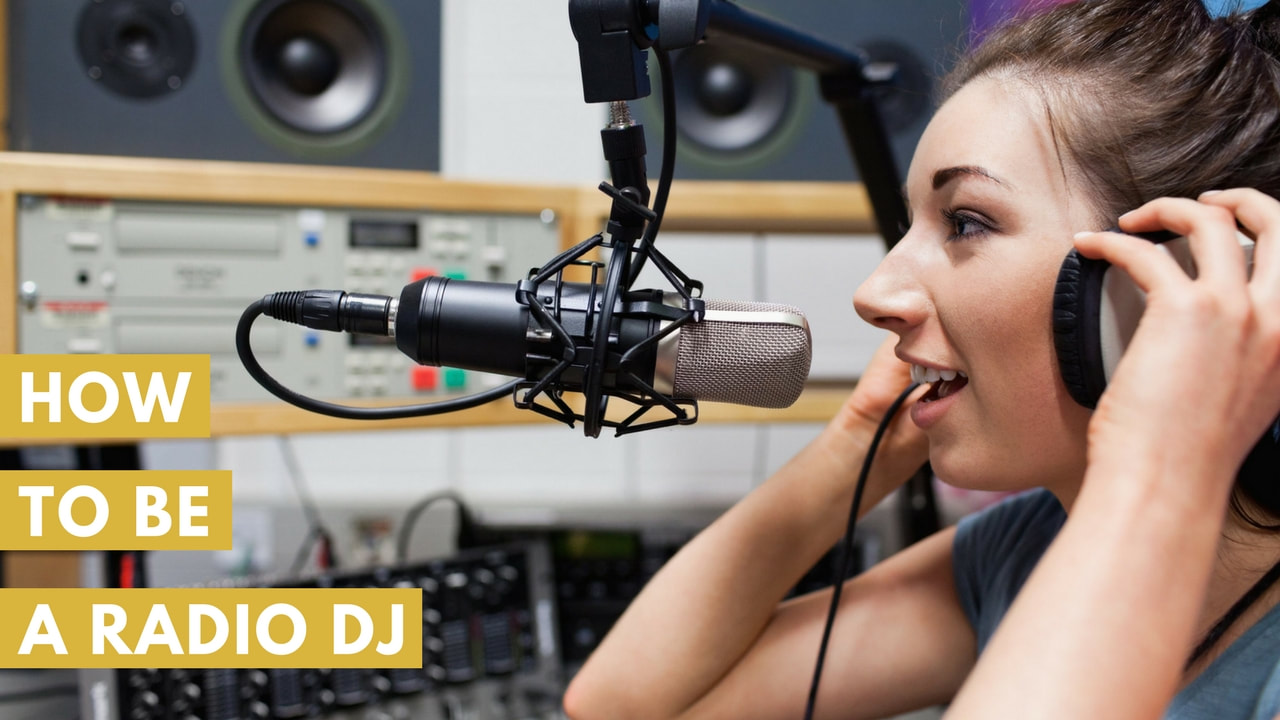
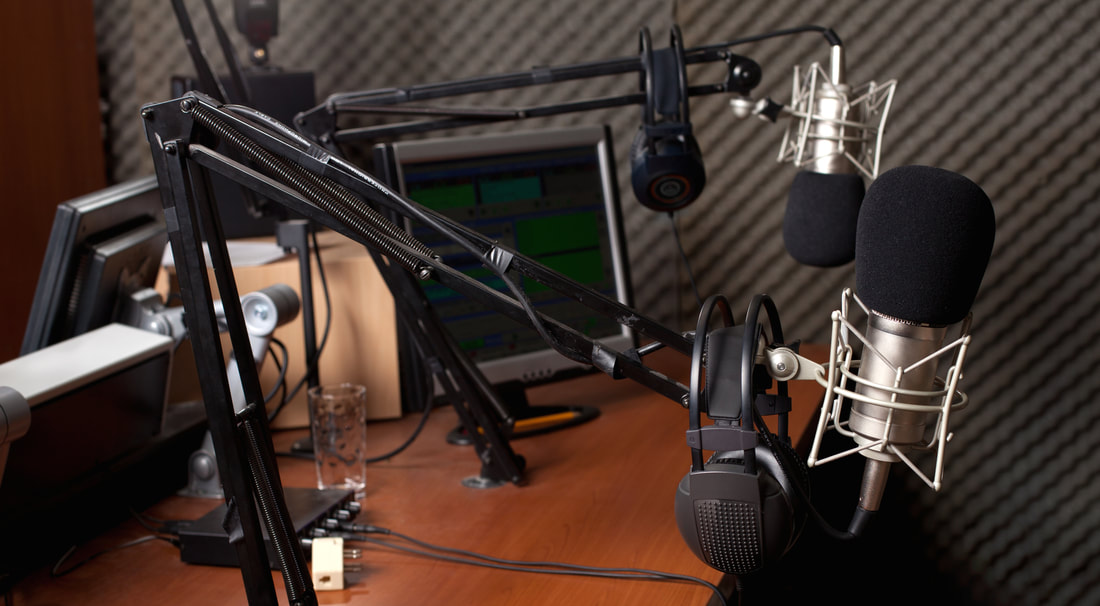
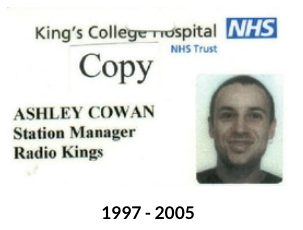
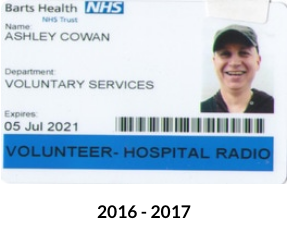
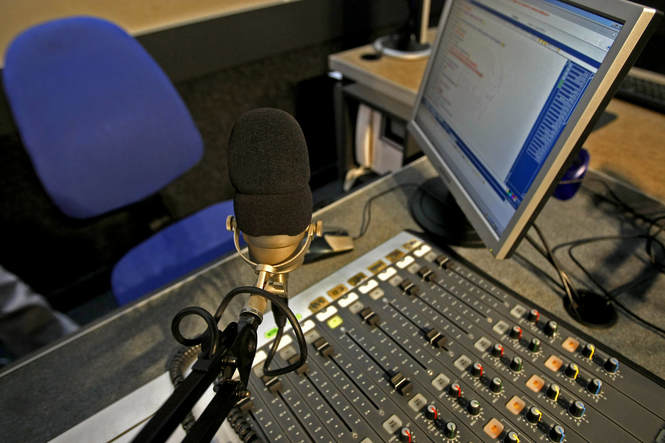
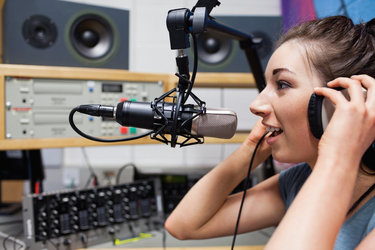
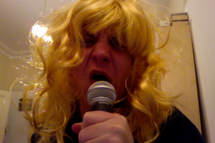
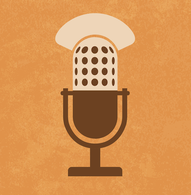
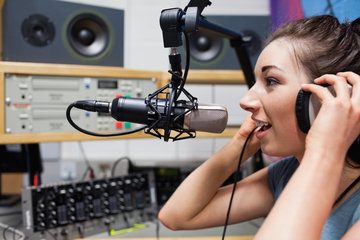


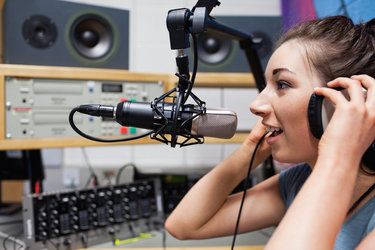

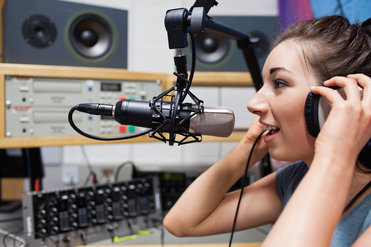
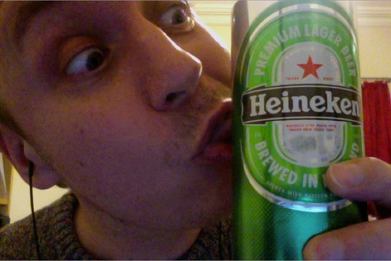
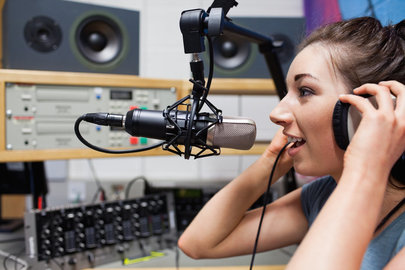
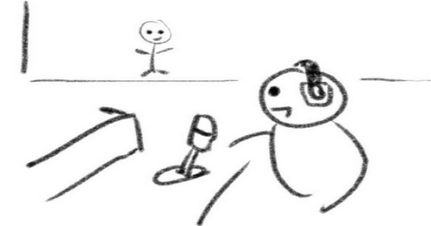

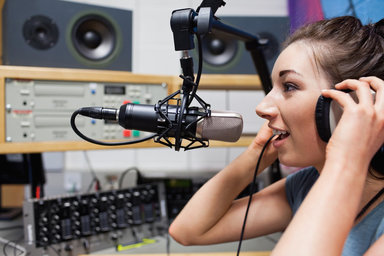
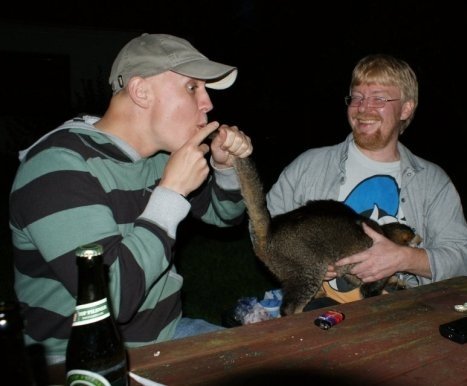
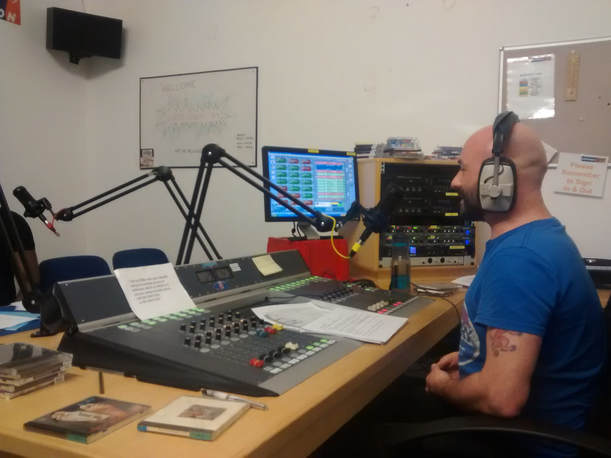
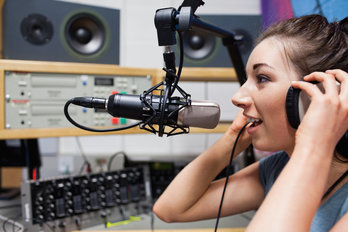

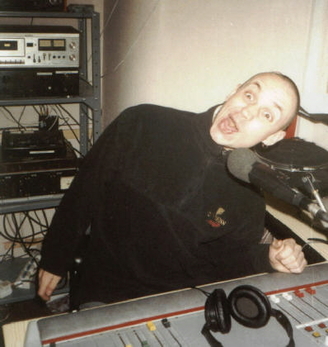
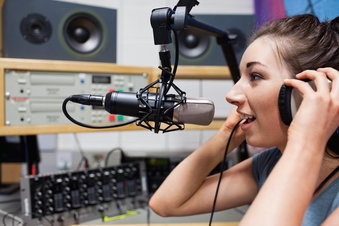
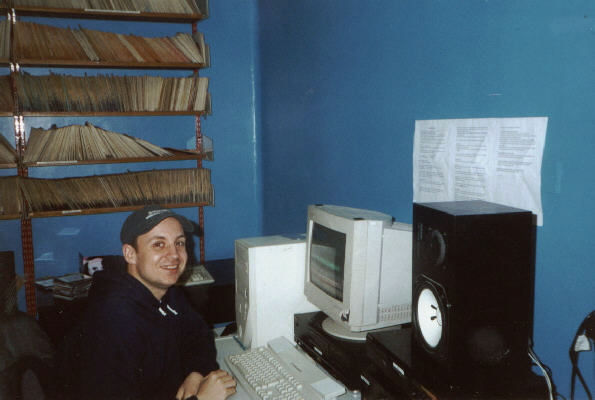
 RSS Feed
RSS Feed
